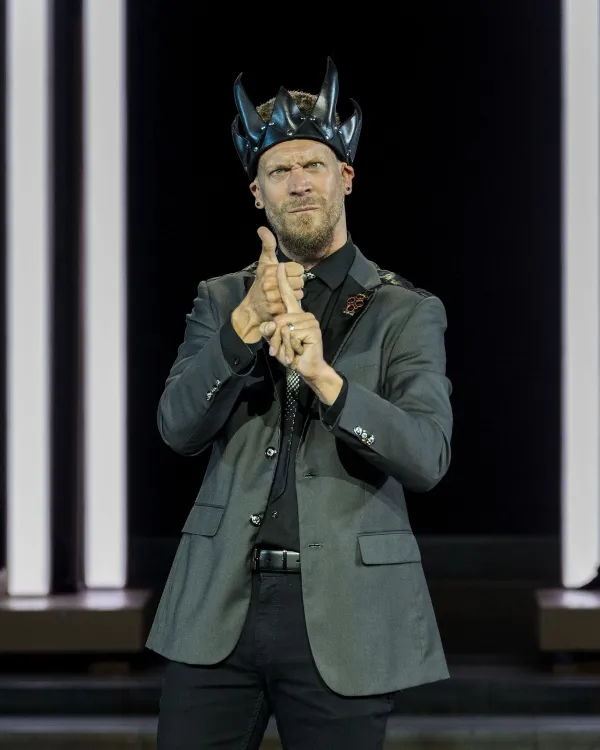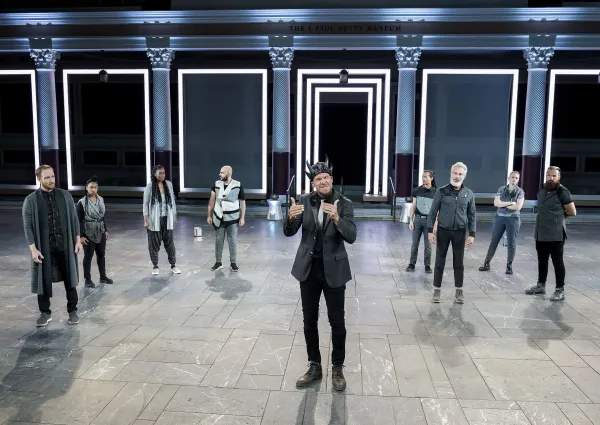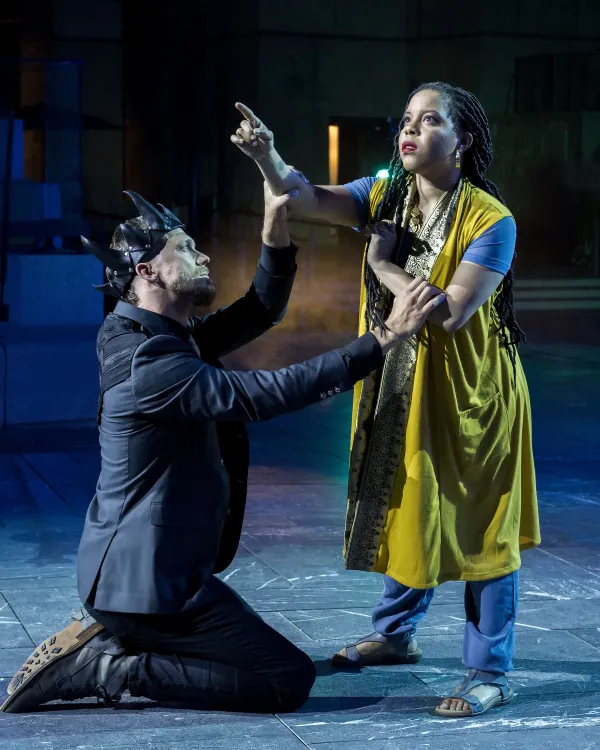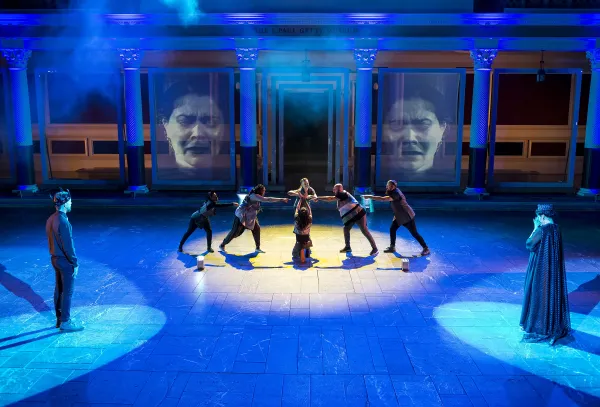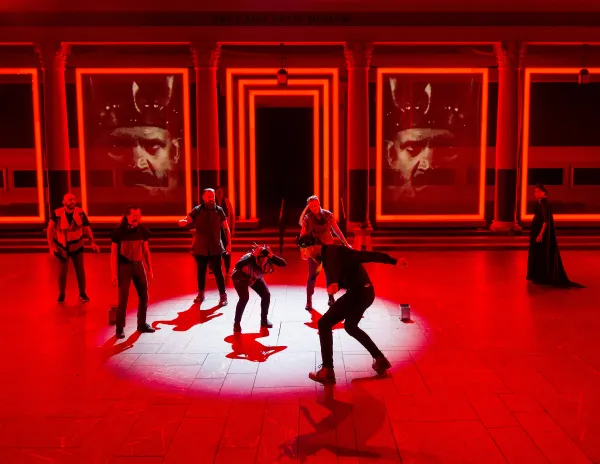Before the premiere of Sophocles’ Oedipus, most of the outdoor tables at the Getty Villa’s café were filled, and while dining I spied from afar a longtime friend of mine, fellow reviewer Myron Meisel, tray in hand, looking for a place to eat, and I waved him over to our table. Joining us, Myron and I were pleased to see we had both survived the you-know-what. As Myron had co-made the 1993 documentary It’s All True, about Orson Welles’ unfinished South America film made during the 1940s, I told Myron that Voodoo Macbeth – a feature about the legendary Welles-directed all-Black 1936 production of the Scottish play reset in Haiti – had been shot, which was news to the astute Myron. I had received a press release about Voodoo Macbeth, which is to be theatrically released October 21, just a couple of days earlier.
Upon finishing my tasty feast, I excused myself, went to the restroom, and upon returning saw that an amazed Myron had been joined at our table by his theatergoing companion and her friend who, amidst much astonishment, was introduced to me as Inger Tudor, who co-stars in none other than Voodoo Macbeth. Inger depicts Rose McClendon, the esteemed African American actress who supervised the Negro Theatre Unit of the Federal Theatre Project, that New Deal program that gave employment to actors and plays – such as Voodoo Macbeth – to the masses during the Depression. What are the odds that mere minutes after mentioning a yet-to-be released movie that one would actually meet its female lead?
I mention all this because one of the over-arching themes of Sophocles’ Oedipus is destiny, and the role it plays in life. Consider that the drama aka Oedipus Rex or Oedipus the King debuts out at the Getty’s amphitheater in Malibu only days after the world’s longest serving and most prominent monarch died. Opening this play about royalty shortly after Queen Elizabeth II’s death is quite a remarkable publicity stunt, just as A Noise Within’s premiere of Animal Farm, Orwell’s parable about the Russian Revolution, hit the boards in Pasadena days after the demise of the last Soviet leader, Mikhail Gorbachev. Talk about PR – or, perhaps, fate…
First produced circa 429 BC in Athens at the Theatre of Dionysus, Oedipus is possibly the best-known Greek tragedy, not least of all owing to Sigmund Freud’s deriving the name for his psychological theory, “the Oedipus Complex,” from Sophocles’ harrowing tale of incest and patricide. The play opens with a plague at Thebes, which is a surefire way to take theatergoers’ minds off of the lingering pandemic that has afflicted us today. It’s downhill from here as Oedipus, the King of Thebes, confronts the affliction bedeviling his realm, prophets of gloom and doom, what we would today call “recovered memories,” murder most foul, and more.
This Deaf West Theatre work as directed by Jenny Koons is an extremely complicated production. According to press notes, “Deaf West Theatre is the artistic bridge between the Deaf and hearing worlds” that is “inspired by Deaf culture and the expressive power of sign language, weaving American Sign Language (ASL) with spoken English.” So, this singular, idiosyncratic interpretation of Sophocles’ classic, as ASL adapted by Andrew Morrill and Alexandria Wailes (who are also cast members), is extraordinarily complex (no, that’s not a Freudian Slip).
Sometimes Oedipus’ DWT thespians speak, other times they sign with their hands; supertitles conveying exposition and more, as well as still and moving images, are intermittently projected on the façade of the classically-designed building located behind the space where the actors perform at the Getty Villa’s amphitheater. This setting, redolent with the sensibility of antiquity, is intended to bestow upon spectators a sense of what it may have been like to attend a play in one of ancient Greece’s or Imperial Rome’s outdoor theaters.
Although the 90-minute show is set in the Thebes of yore, for some reason that escapes this reviewer, the cast of 11 or so multi-cultural actors are all clad in modern dress. Once again, audiences are treated to a presentation of a Greek classic, but for whatever costumers’ conspiratorial reasons, not a single solitary toga is to be beheld. Alas!
In any case, the DWT performance is at all times infused with a highly mimetic expressiveness. Starring as King Oedipus, Russell Harvard, who majored in theater at Gallaudet University in Washington, D.C., delivers a powerful performance as a commander in chief who is, in reality, not in command of anything or anybody, and is merely subject to the whims of the gods. Angeleno audiences have had the opportunity to see the versatile Harvard onstage at the Mark Taper Forum in Tribes, as well as on the big screen in Paul Thomas Anderson’s 2007 There Will Be Blood, opposite Daniel Day-Lewis, and on the little screen in the FX miniseries adaptation of the Coen brothers’ Fargo.
Compton-born Ashlea Hayes is appropriately feisty as the ironically blind prophet Tiresias who manages to clearly see the truth – whether His Majesty likes it or not. Co-adaptor Alexandria Wailes is striking as the demanding queen, Jocasta – although the age difference between her and her husband/son (she must be at least 18 or so years older than Oedipus) never seems to be an issue, especially centuries ago when most people had shorter life spans. Akia Takara is piteous as the shepherd who, years before, was an eyewitness to King Laius’ homicide. Jon Wolfe Nelson is imperious as Oedipus’ brother-in-law Creon, who warns Thebes’ monarch that the Delphic Oracle proclaims the Theban plague won’t end until the Laius’ murderer is caught.
Since this is a Grecian and not a Roman play, all roads may not lead to Rome per se, but Oedipus Rex is powerless before the forces of destiny and not even a monarch can escape the fate and trap that the deities seem to have set for him. It’s as if the gods are telling poor Oedipus to “Go pluck thyself!”
This is the 16th mounting of an ancient Greek or Roman live stage play at the Getty Villa’s amphitheater, and an annual pilgrimage out there to experience a performance under the Malibu stars is truly a yearly cultural highlight. But given Oedipus’ themes of incest and violence, this show is not for children and is intended for the more serious, mature ticket buyer. Those interested in classical theater, crime dramas, deaf and other-abled works plus strong drama and philosophical musings in general are most likely to appreciate the age-old play that gave humanity Freud’s Oedipal Complex.
Oedipus takes place 8:00 p.m. on Thursdays, Fridays, and Saturdays, through October 1, 2022, at the Barbara and Lawrence Fleischman Theater at the Getty Villa, 17985 Pacific Coast Hwy, Pacific Palisades, CA 90272. Tickets: (310)440-7300 or https://tickets.getty.edu/Online/default.asp?BOparam::WScontent::loadArticle::permalink=oedipus&BOparam::WScontent::loadArticle::context_id= .



